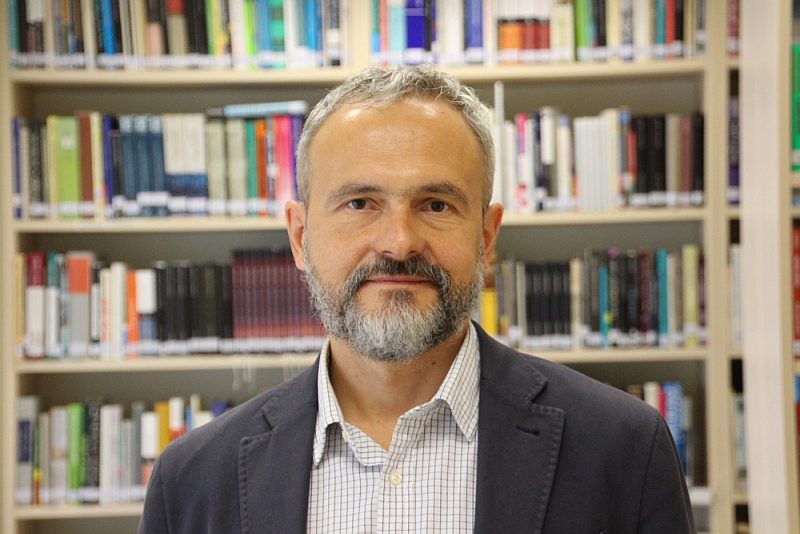
Vyacheslav Morozov: Russia’s elite chant that Russia is “not the West”, that we are “different” and “more spiritual”, that we stand for “traditional values”. But these are just words with no real content.
Photo from personal archive
21:22, September 3, 2021
–
Juris Lorencs, “Latvijas Avīze”, JSC “Latvijas Mediji”
Vyacheslav Morozov was born in 1972 in Kazakhstan and studied history at St. Petersburg State University. Lives and works in Estonia since 2011, is a professor at the University of Tartu, director of the Center for Eurasian and Russian Studies. His scientific interests include Russia and the former Soviet Union as a postcolonial space. He has written the books Russia and Others: The Identity and Boundaries of Political Society (2009) and Russia’s Postcolonial Identity: A Subordinate Empire in a Eurocentric World (2015). In the conversation, Vyacheslav Morozov shows that Russia has also become a colony.
–
The news
In the migrant camp in Lithuania, a caste system is being formed and sexual exploitation is taking place
8 hours
–
The news
The former Minister of the Interior: The events of the housing robbery are worrying. Thieves even use mobile network suppression!
6 hours
–
The news
“Let go out, I was in the army with the dog handlers”
10 hours
–
Professor, you have been living in Estonia for a long time and you will have noticed that the Baltic nations – Estonians, Latvians and Lithuanians – build their identity at least in part on the basis of post-colonial feelings. Latvians talk about seven hundred years spent under German-Baltic nobles. On the strangles of tsarism, Soviet and Nazi occupations, deportations and terror. The location of Latvia and the Latvian people is subject to and used as a colony. In your work, in turn, you discuss at first sight the paradoxical idea that Russia itself has been and still is a Western colony throughout its existence. How is that possible?
V. Morozov: There is a concept of a “subordinate” empire, and Russia is a clear example of such an empire. In times of tsarism, its upper classes – the Europeanized aristocracy and officials of St. Petersburg, the local nobility – treated their land and its people as the colonial administrations of the Western empires against the subordinate peoples. This could be called a kind of “internal colonization”.
Not only peripheral territories and peoples such as Central Asia, the Caucasus, Ukraine or the Baltics were oppressed, but also the Russians themselves.
At the same time, the peculiarity of Russia is that its Europeanized ruling class behaved like agents of Western influence.
Formally, they were distinctly Europeans who had enjoyed a European education and spoke several foreign languages. For these people, Europe was the center of civilization and culture, the point of reference, the determinant of taste, fashion and ‘good tone’. As aristocrats, they also enjoyed a high status in Europe. At the same time, it did not prevent this Europeanized Russian elite from exploiting its land, literally draining its resources and selling it in the West. And this is already a phenomenon common to colony administrations.
What exactly was “sucked out” from Russia?
Raw materials. Three hundred years ago they were fur, honey, wax. In the 19th century, timber, black caviar, cereals and flax joined these exports. In the period after the Second World War to this day – metals, oil and gas. So the resources that were and still are needed by the developed West. But such economic relations are not inherently equal, they hide exploitation.
You use the word “rent” in your own publications.
It is an economic term that describes a disproportionate income from the use of natural resources. The word “excess profit” is also sometimes used. It doesn’t take a huge investment to drill a hole in the ground and start pumping oil out of it. However, the profits from such a business are disproportionate. Understandably, the state is tempted to take away this tax, to tax it.
There are countries where rental income is channeled to the common good. For example – in Norway. Unfortunately, against a general background, this country is rather the exception.
Usually, rents adversely affect the development of the state and society, slow down economic and political reforms. If only because the problems can be patched up with money for a while. The process that ultimately leads to stagnation. Paradoxically, countries that are poor in natural resources are developing faster and more successfully. A clear example is the Asian countries – Japan, South Korea, Taiwan, China and now India.
Another feature of the annuity is its close connection with corruption.
In many resource-rich countries, rents will be appropriated by small groups of the elect, one of which is Russia.
Thanks to a special closeness to politicians and power, the ability to influence their decisions, some people have shattered and continue to plague fabulous riches. The consequences – income inequality, the large number of billionaire dollars.
You mentioned that during the tsarist era, the Russian elite behaved like agents of global Western capitalism. Will it continue today?
Of course! Even today, Russia’s economic and power elites benefit personally from the use and sale of Russian resources to the West. However, certain political fees must be paid for this.
Russia’s elite complains that Russia is “not the West”, that we are “different” and “more spiritual”, that we stand for “traditional values”. But these are just words with no real content. Their money is in the West, villas in Switzerland, France, Italy and Florida.
Their yachts sail in Mediterranean and Caribbean waters. They are treated in Western clinics, while children study in Western schools and universities.
Many have already moved permanently to the West and see Russia only as a source of income.
Russia’s official ideology is constantly talking about the country once again “recovering from humiliation”, that it is following its “special” development path. This was also what Russian literature was looking for from Dostoevsky to the “rural prose” of the Soviet era. But is that little possible?
Since the time of Peter I, the ideology of the Russian state has been focused on Europe. This can be challenged and denied, but it was Europe that was and still is the benchmark that Russia is trying to emulate and follow. Russia is a peripheral power that has always strived for a rich and developed West.
Even during the Cold War, in the 1970s and 1980s, the idols of Soviet youth mass culture were in the West. Western consumer goods, fashion, music, literature and cinema were respected. Today is exactly the same. Russia’s special development path cannot be found for the simple reason that Russia is also part of Europe. Other, but European.
Is Putin European?
In his basic principles and basic settings, he focuses on Europe. Another issue is to some Europe. The goals he strives for, the values, the view of the world through the prism of geopolitics – it all came from classical 19th century European politics. It is no secret that her ideals are Nicholas I and Alexander III. In addition, Putin is an isolationist, but it is also a European-born idea.
So Russia can’t escape Europe anywhere?
Because all roads lead to Europe, both figuratively and literally. Europe has a market for Russian resources. Europe has its transport infrastructure, roads, railways and pipelines.
But China?
This country is an awkward, unyielding, even cynical partner. China is well aware that without Europe it is the only real alternative to Russia, and there is no hesitation in taking advantage of this.
So the confrontation with the West that has been talked about so much lately is not possible?
Let’s hope not. Because the values for which the spear is broken, at least for the time being, are secondary. For example, the concept of democracy. Liberal values are now considered the standard in the European Union. However, Europe’s understanding of how a country is governed is much older and broader.
Today, Russia is an authoritarian, centralized state. Similar to Prussia, only less effective, without German discipline and order.
Nothing extraordinary, such countries have been and will be in Europe.
But the annexation of Crimea?
An example is that the values may differ. In modern Europe, there are norms of behavior that Russia has grossly violated in this case. Russia’s arguments were geopolitical. For example, defending the interests of compatriots. We are just reacting, trying to stop Western expansion. We do not want the Russian fleet to be expelled from Sevastopol, we do not want to see NATO warships there. It was a disproportionate reaction to the events of the Maidan revolution.
Where do you think the colonial nature of these countries was most evident in the tsarist empire and the Soviet Union?
In Central Asia. There lived culturally completely different peoples, partly conquered, partly subjected to unequal treaties. In tsarist times, the reason for the expansion was geopolitics, as British-held Afghanistan was nearby.
But demographically, this region developed rapidly…
And Russian cities today are full of immigrants from Central Asia. The empire is giving back the blow! The same is happening in Britain and France.
If you subjugate and colonize a region on the far periphery of the empire, you should expect it to become part of the center of the empire over time.
The events currently taking place in Afghanistan, the coming to power of the Taliban, will also affect Central Asia. So also indirectly Russia.
Many are worried that Russia could annex Belarus.
The fact that the majority of the Belarusian people speak Russian on a daily basis does not mean that it is part of Russia. Belarusian national identity has long been established, and thirty years of independence have further strengthened it.
This nation has its own self-confidence, its own mentality, and it is well understood and recognized by the Russians themselves.
Especially those who have visited small towns and countryside in Belarus. Everything is clean, tidy, landscaped. A huge difference from the Russian province. Belarusians are even more inclined to Europe than Russians, which is partly explained by its geographical location.
This morning [mūsu saruna notika 26. augustā] Tartu could already feel the approach of September 1. Young people can be seen everywhere, different languages are spoken. Understandably, students are slowly beginning to return to the city. What does university mean to the city?
Tartu and the university – these words have long been synonymous. Since regaining independence, the Baltic States have made great strides in their development, becoming part of the Western world. It seems to me that the societies of these countries are already strong enough to start getting rid of the complexes of the past. It also means the ability to see the positives left behind by foreign powers.
What would Tartu be without a university? Only a little-known provincial town in Estonia. Today, thanks to the university, Tartu is one of the cultural and scientific centers of Northern Europe. But who then founded this educational institution, which set its special spiritual aura? Swedes, local German-Baltics, later also teaching staff from the Russian Empire.
The city was located on the border between West and East, at the crossroads of geopolitical spheres of influence. There was a struggle for influence, in which the Russian Empire wanted to establish itself in the then very German Baltic provinces. The University of Tartu is, at least in part, an heritage left by empires, and one should not be ashamed of it. Especially today.
Themes
–


